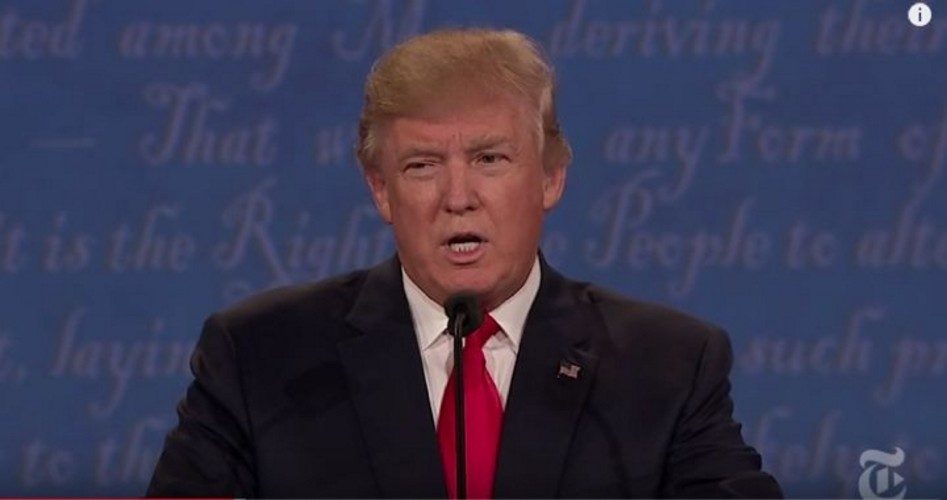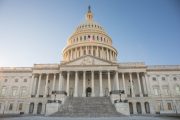
From Fox News to CNN, Donald Trump’s refusal to promise he would accept the outcome of the election results next month drew most of the media reaction — and scorn — in Wednesday night’s final debate between Trump and Hillary Clinton. Brett Baier of Fox News even said Americans have always supported the “peaceful transfer of power” through elections.
Trump said during the debate that he would have to wait and see what happens in the election before he could say if he could accept the results.
This seems logical. It is true that Americans generally accept the results of an election, largely because they know they will have another chance to prevail in two or four years, and if they believe the election is conducted fairly. What Trump is arguing is that the election results this year are at least potentially “rigged.”
Trump cited the results of a 2012 Pew report to back up his assertions. “If you look at your voter rolls, you will see millions of people that are registered to vote — millions, this isn’t coming from me — this is coming from Pew report and other places — millions of people that are registered to vote that shouldn’t be registered to vote,” he said.
Included in the Pew report is information that about 24 million voter registrations in the United States are no longer valid or are significantly inaccurate; more than 1.8 million deceased individuals are listed as voters; approximately 2.75 million people have registrations in more than one state.
Pew attempted to dispute Trump’s concerns, based on its own report. “The report did not allege that 1.8 million deceased people actually voted. Rather, Pew said that it is evidence of the need to upgrade voter registration systems,” the organization responded.
This is mostly missing the point. No one, including Trump, is arguing that 1.8 million deceased people are actually voting in U.S. elections. Actual voter fraud is hard to prove; the system should be secure enough to prevent the possibility of widespread vote fraud so we do not have to worry about it happening.
The concern of Trump, and it should be the concern of each honest American, is not that millions of fraudulent votes are being cast, but that of the millions of persons mentioned in the Pew report, there could be thousands of fraudulent votes across the country. Even if this only changed the outcome of the popular vote, it would not be irrelevant, but an even more serious concern is it could alter the outcome of the vote totals in the Electoral College.
A case in point is the disputed 2000 election, in which Republican George W. Bush scored a narrow 271-267 victory over Democrat Al Gore. Had Gore carried just one more state, he would have been elected president. This is why the results in the state of Florida, where six million people voted, were so important. Bush won by only 587 votes statewide.
What if persons registered in both Florida and Alabama (or Georgia) crossed over into the Florida panhandle and voted on election day? What if a mere 1,000 votes were cast by individuals claiming to be a person who was actually deceased? These “tombstone voters” could have, at least theoretically, altered the outcome of the entire presidential election.
And of course, we have the Democrat election commissioner of New York City, admitting on video, “there’s a lot of vote fraud.” This was followed by a Project Veritas sting video which showed a Democratic Party operative, Scott Foval, giving advice on how to commit fraud!
So, yes, there is vote fraud, and we should not just “accept” the corruption of American presidential election.
Al Gore did not accept the outcome of the election, at least not for 36 days. Instead, Gore challenged the results, demanding a recount in selected counties, such as Palm Beach County, that tended Democrat. For those who pontificate that “we must accept the results even before we know what the results are, and how we got those results,” Gore is certainly no poster child for that.
Instead, Gore used every legal maneuver he could to overturn the “results” announced on election night. In fact, he ignored Florida election law, which dictated that all recounts had to be completed by a certain date, taking his case to the Democrat-dominated Florida Supreme Court. The Florida Supreme Court ruled that the recount should continue, despite the clear wording of Florida law, which said the results had to be certified by a certain date. Article II, Section 1 of the U.S. Constitution gives plenary power to the state legislature of each state to “appoint, in such manner as the legislature thereof may direct, a number of electors.”
The failure of the Florida Supreme Court to follow the election law as instituted by the Florida Legislature created a constitutional crisis in the United States, which was eventually resolved by the U.S. Supreme Court.
Despite claims by some media personalities that Gore “accepted” the outcome of the election, the truth is he did not, at least not until he had exhausted all avenues of changing that outcome. He wanted, understandably, to make sure that the outcome as announced on election night was the fair and correct outcome. Of course, Republicans, just as understandably, mocked his efforts, calling the Gore-Lieberman ticket the Sore-Loserman ticket.
This was not the first time in American history that a presidential election was not just “accepted.” It is true that there has been a “peaceful transfer of power” from incumbent presidents to their victorious challengers since Thomas Jefferson defeated John Adams in 1800, but in none of these cases was there any doubt about the outcome. Gerald Ford, for example, transferred power to Jimmy Carter in 1976, and Jimmy Carter to Ronald Reagan in 1980, but in neither instance was there any doubt as to who had won the election.
But it was not clear in 1876 when Samuel Tilden of New York, the Democratic Party nominee, lost to Rutherford Hayes of Ohio, the Republican candidate. In that election, Tilden held a margin of 184-165 in the Electoral College, with 20 votes in dispute. After Oregon’s one vote in dispute was quickly resolved in favor of Hayes, it still left three states — South Carolina, Louisiana, and Florida — up in the air.
Those three states were the last three states still under military occupation by federal troops in Reconstruction. Two sets of election returns had been reported — favoring either Tilden or Hayes — and there was nothing in the Constitution or federal statute to settle the dispute.
In this circumstance, Congress created the Electoral Commission to investigate. The Commission was composed of eight Republicans and seven Democrats, and not surprisingly, they voted 8-7 to award the election to Hayes, the Republican.
The Democrats were livid, with some threatening a “second Civil War.” This is hardly “acceptance” of the results!
Wishing to avoid another civil war, as the first one had cost America about three-quarters of a million lives, the two parties compromised. The last of federal troops would be withdrawn from the South, and a southern Democrat would be named postmaster general. In exchange, Hayes would be allowed to be sworn in as president two days later, on March 4, 1877.
But the Democrats continued to proclaim, “We were robbed.” They questioned the legitimacy of Hayes’ presidency, hurling insults at him, such as “Old Rutherfraud,”or “Old 8-7.” Not surprisingly, Hayes did not seek another term in 1880, as the Democrats had never “accepted” the results of the 1876 election.
Hoping to prevent such a spectacle again, a statute was enacted in 1878 to deal with any future scenarios such as the one that almost split the country asunder in 1876. If a state could not agree on its results, the House of Representatives and the Senate would vote on which set of election returns to accept. If they agreed, the conflict was taken care of. But if one house voted one way and the other house the other way, the final decision would be sent to the governor of the state in question to decide.
So, in 2000, had it come to it, and the House and Senate could not agree (the House was Republican then, and the Senate was Democrat), the governor of Florida would have had the final say as to which candidate received the state’s 25 electoral votes.
The governor at the time was Jeb Bush, brother of George Bush, the Republican candidate.
Do you think the Democrats would have “accepted” that result?



